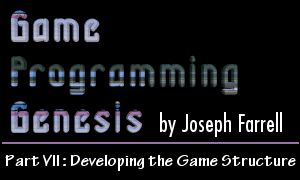11/10 - 11/12 @ Montréal, Canada
12/5 - 12/7 @ Shanghai, China
12/24 - 12/27
2/28 - 3/4 @ San Francisco, CA
More events...
2406 articles in the reference section.
Help us fight cancer!
Join SETI Team GDNet!

|
A Word on Game StatesThe approach that I have just described, dividing your program up into several states, is a good one because what it does is to allow you to consider your program as a number of smaller programs. Instead of trying to develop the whole thing at once, you can just do one state at a time, which is simpler to write, and simpler to debug. All you have to do is change the game's initial script to set the active game state to whatever it is you're currently working on, and you can test it independently of the other aspects of the game! My approach to Terran was obviously to write the scripting engine first, since it requires a script to initialize. Mainly I wrote up all the basic logical functions like decision statements, loops, and variables. After the scripting engine was on its feet, I went to the world map state. Once I had that all set up, and had tested it independently of the scripting engine, I wrote the menu system. After it was done, then I tested the game with all three elements integrated. This was not hard to do -- in fact, it required no C code on my part, because the scripting engine makes all the transfers of control. So basically all I did was write a simple script, and then sit back and watch it all happen. :) Now I've come to the battle system. I actually haven't started coding it yet, but you wouldn't know that from the level of detail I already know the implementation in. I have all the logic diagrams and such drawn out, so I know exactly how everything will work. The only thing that remains is to actually write it, which takes awhile even if you know exactly what you're going for. But when I start doing this, I'll take out the game's current initialization script that sets up the whole game, and insert one that simply sets up a battle. In this way, I can develop the battle system as though the rest of the game wasn't even there, so I don't have to worry about it. Once the battle system is done, I'll just put the old initialization script back into place, and just like that, the new component is integrated. My recommendation would definitely be to try setting up something like this for your game when you start it. As you can see, it makes the development process a lot nicer and results in fewer shouting matches between the programmer and Visual C++. Those are tiring, becausethe compiler always wins. It does against me, anyway. :) |
|
|
|
|